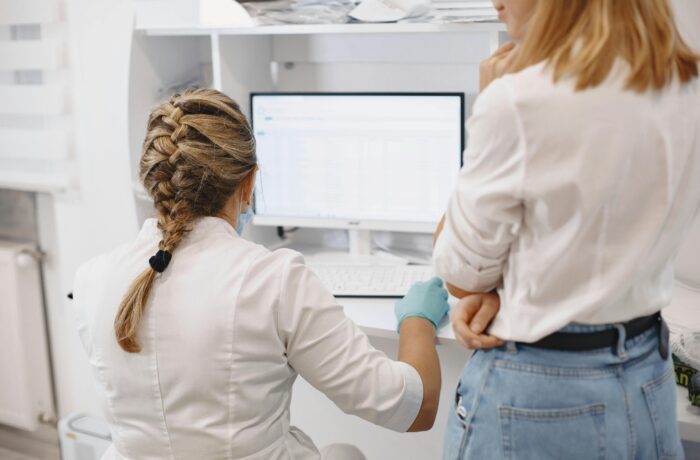Robotic Process Automation – A tool to aid Clinical Practice?
Posted on
Digital Pioneer Fellow Stephanie Lurshay is Senior Pharmacist for Electronic Medicines, Prescribing and Administration (EPMA) and Clinical Informatics at the Royal Brompton and Harefield Hospitals (RBHH). Her role is to manage and continually improve the organisation’s digital systems and processes to help patients to obtain the medicines they need in a safe and effective manner. With a clinical specialism in critical care, the heart of her work in digital pharmacy is driven by the same key principles as when providing pharmaceutical care to patients – to safely provide the right medicine, to the right patient and at the right time.
My introduction to automation
I’ve always been excited and interested by new technology, and particularly how I can harness the potential to benefit patients and colleagues. Pre-pandemic, I started working with Microsoft’s low-code platform for automation – PowerAutomate.
I used PowerAutomate to create an electronic ordering process for pharmacists to order medications for patients from critical care areas – previously all ordering was completed on paper and requests were hand delivered to the dispensary. Often pharmacists would leave the ward and move away from their valuable clinical work to deliver urgent medication requests. An automated ordering process was particularly appreciated during the peaks of the pandemic where movement between COVID ‘red zones’ was restricted, and staff worked in full PPE.
From this experience, I was interested to see what other possibilities there might be for automation in pharmacy.
Robotic Process Automation and transcription of medicines
Robotic Process Automation (RPA) is software where a ‘bot’ or ‘digital worker’ mimics human activity with the keyboard and mouse of a computer to complete a set of predefined tasks. It has better capability than PowerAutomate as it has the potential to automate more complex processes.
My journey with RPA began when I took lead on an already established project for my Digital Pioneer Fellowship. The aim was to use this technology to aid with transcribing prescriptions from one EPMA system to another. At RBHH we have two EPMA systems, one for critical care and another for general ward areas. When a patient moves between critical care and the ward, the medicines must be transcribed from one EPMA system to another. This process is time consuming for the prescriber and the transcribing is prone to human error.
The RPA transcribing bot has been successful and passed the first phase testing. This was a feat, as at the time there were no other known projects which were looking to RPA to directly aid a clinical process.
There have been some challenges in the next phase of testing to transcribe more realistic scenarios. I found the Digital Pioneer study days valuable in aiding me to overcome some of these and finding a way to see the ‘wood for the trees’! I seek to overcome the last hurdles to demonstrate that the bot can transcribe medications accurately and show time-saving benefit for prescribers.
In my view, these challenges have highlighted the complexity in transcribing medicines and the amount of clinical intervention which is often required.
This poses a question – can a bot ever be good enough to directly aid such a clinical task?
A change of direction and looking forward
The learnings gained from this first RPA proof of concept have been invaluable as the Trust seek to deploy not just RPA for a single process – but for multiple tasks across the organisation. I’ve been able to share my learnings with the Trust and had the opportunity to network with people across the UK who have experience of successful RPA projects to enhancing my knowledge of the field. The guidance and connections that my mentor from the Digital Pioneer program has really been of true value, for example connecting me with Maddy Borhani, NHSX’s RPA Partnerships Manager, to gain a boarder understanding of national drivers for RPA. Just this week NHSX launched guidance for Digital Transformation – ‘What Good Looks Like’ – themes which will underpin the RPA project.
It has been an interesting to find that different NHS organisations are using different RPA platforms. The leaders in RPA software across the world as defined by the Gartner Magic Quadrant 2020 report are Automation Anywhere, Blue Prism and UIPath and I have found examples where each of these have been used successfully in the NHS.
Through my research into RPA in the NHS I’ve been intrigued and inspired by the achievements of others. Most memorable was a meeting with Swansea’s University Bay Hospital who have used RPA to assist their pharmacy Homecare service. One such process is using RPA to clinically validate Homecare prescriptions to reduce the burden on pharmacists. Such an idea is exciting development for RPA as this is a heavily clinical task. At the time of our discussion this too was a successful proof of concept.
This does revive the question – can a bot be used to aid a clinical task?
It most probably can! Providing there is precise programming and RPA works lawfully in the best interests of the patient to support clinical staff, perhaps anything will be possible.
DigitalHealth.London is delighted to publish blogs by the NHS staff and digital health companies we support through our programmes, as well as sector thought-leaders, experts and academics. Any opinions expressed within blogs published on our website are those of the author and not necessarily held by DigitalHealth.London. For more information, or if you would like to write a blog for our website, please email info@digitalHealth.london.


